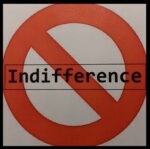One of our children’s favorite games used to be “ten questions”. One person would think of a person or thing, and the others had to solve the mystery of what or who that was, by asking questions, that could only be answered with yes or no. The game ended when the mystery was identified, or ten questions were answered in the negative, with a no.
The trick was in phrasing questions in such a way that the answer would more likely be yes. It was interesting to observe how often the mystery was discovered, not by asking to confirm certain attributes of the mystery, but by asking what it was not, basically solving the mystery by elimination.
Talking about what one is not, seems to be easier then exposing one’s virtues or hang-ups. Identifying a personality and character by way of elimination, may take too long, but approaching the question of identity from both, the what and the what-not ends, will provide a faster and more insight-based answer.
So, what am I not?
If I was representing the mystery item in a ten-question game, and someone may ask: Am I correct that the mystery is not a tree? The answer would be yes. I have been called a Holzkopf (Woodhead), but that does not make me a tree. Nowadays calling someone a Holzkopf or blockhead, would be considered disparaging and/or bullying. In times past, language like this was generally used and received in good humor. Genuine humor has unfortunately been one of the casualties in the making of our “progressive” society. To be clear, I am not a member of the intelligentsia. I am not an author and are not writing this blog out of any position of strength or special insight. If anything, this blog has grown out of my weaknesses. It will be obvious to the readers that I am struggling with grammar, spelling, and vocabulary, but just so you know, I am painfully aware of it.
I will be using simple language, to talk about life as experienced and contemplated by a common person. A kind of mix of farmers wisdom and common sense. The Net defines common sense as “sound practical judgement concerning everyday matters, or a basic ability to perceive, understand, and judge that is shared by nearly all people” I’m not sure when that definition was written, but I doubt the “that is shared by nearly all people” portion of the definition still applies.
As new words and phrases are coined at an ever increasing speed, the use of two more old fashion phrases “common sense” and “conventional wisdom” appear to be on the way out. It would be interesting to consider what that means.
Until next time, Horstt
